Case study 15: United Kingdom: Growing pulses and innovative crops for a less resource intensive diet
Cluster 3: Crop diversification in systems from Western Europe
From the question ‘Can Norwich feed itself?’, a group of motivated citizens went on to try to understand how local farming and diets would have to change and adapt to reach this goal. This raised awareness of the benefits of growing more pulses both for human nutrition and agroecological functions. Moreover, it led to the realisation that much of the food-grade pulses that were produced in the area were exported to North Africa. They initiated an experiment, bagging fava beans bought from a commodity trader and selling them on local markets. An overwhelming positive response gave the impetus to take this further and Hodmedods was set up as a commercial company to support the production, processing and marketing of pulses and other novel grains.
This case study has explored the Hodmedods value chain from seed to fork, enabling knowledge exchange with other short value chain initiatives supporting diverse cropping systems, exploring how value is shared along the chain and the relationships between actors. Moreover, this case study has sought to respond to an increased interest in plant-based diets, communicating the benefits of diverse cropping systems and helping consumers make informed choices.
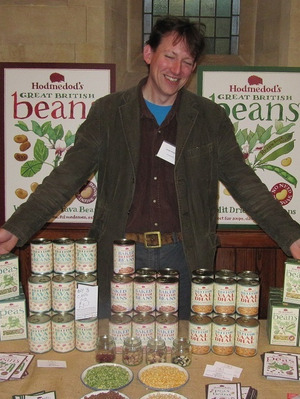


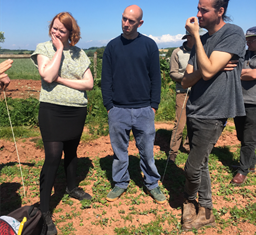


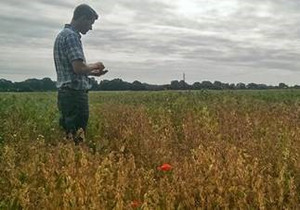

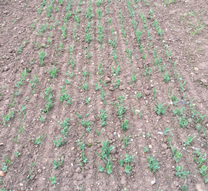

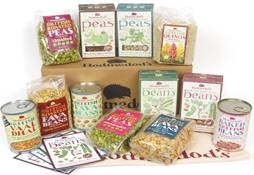
What were the main problems underlying the emergence of the case study?
Many arable farmers are stuck in the commodity trap. Despite evidence of the benefits of diverse cropping systems at a genetic, crop and rotation level, arable cropping in the UK remains relatively focused on a small number of crops grown in large quantities for the commodity market.
The infrastructure built up around these commodity markets (harvest, storage, transport, processing and marketing) does not allow for small batches of more diverse and novel crops. As such, there is great potential for initiatives which seek to support farmers with these elements to enable greater diversification at a genetic, field and rotation level.
Increasing interest in plant-based diets is creating demand for more pulses, however much of this is currently met by imports and is not supporting crop diversification and associated agroecological benefits in the UK. There is a need to support consumers to understand more about food and farming systems, the role of diversity and their role in supporting a transition to more agroecological farming.
How was the problem addressed and which actors were involved?
The initial group of initiators, Josiah Meldrum, Nick Saltmarsh and William Hudson set up Hodmedod Ltd. in 2012 to supply beans and other less well known products from British farms.
Farmers are supported to access seed and basic agronomy advice. Products are bought at a fair price, processed, packaged and marketed through direct online sales, retail and wholesale. Many of the farmers in the network are also implementing innovative crop diversification practices such as intercropping (namely cereals to provide scaffolding support and weed suppression to pulses).
Hodmedod Ltd. has a close network of various actors along the value chain:
- A number of farmers who grow certain varieties and crops for them and run trials for new products (e.g. quinoa, faviola beans etc.)
- A wide range of supportive and loyal customers for their online sales
- A number of larger whole-sale partners
- Different processors for cleaning and milling of pulses and grains, and for canning
- The John Innes Centre Seedbank to help identify suitable new/old varieties and crops that do not necessarily provide the highest yields or disease resistance but have better nutritional quality and taste.
Solution investigated
The following solutions are investigated:
- Supporting farmers with production, processing and marketing of pulses and other novel grains.
- Selling to a growing market of consumers concerned about health and sustainability.
- Seeking more resource-efficient diets.
- Innovating with cropping systems to include more diversity at a genetic, field and rotation level.
Expected outcome
The three main expected outcomes are:
- Knowledge exchange enabled between Hodmedods and other short value chain initiatives with similar goals - sharing lessons learned and practical experiences in the production, processing and marketing of diverse crops - in order to create a vibrant alternative food network which supports diverse cropping and agroecology.
- Deepened understanding of the Hodmedods value chain and how value is shared, ensuring that farmers and consumers have a fair price and seek to understand other non-financial value on farm and in the food system
- Enhanced consumer understanding of the role of diversity in cropping systems, creating engaging stories to communicate the complexities of food and farming systems and developing new relationships between farmers and consumers
Relevance to the DiverIMPACTS goals
This case study provides a rare opportunity to study an approach that was started by a consumer initiative for more sustainable diets for the community. Here, we can study the entire value chain of a business with very close networks both up and down stream, supporting local businesses and regional structures.
Case study legacy
There is great promise of the case study network remaining together and even growing beyond the project’s conclusion. The Hodmedod farmer network continues to share experiences and the case study leader is motivated to continue to make the exchanges happen beyond the project. Further funding sources for future activities have been identified such as the inclusion of the network in the upcoming DIVERSify (Horizon EU) funding call. The Organic Research Centre will also look to build on case study initiatives with its own small funding pool with the 2021/22 Organic at the Heart funding appeal.
There will be a focus on building local networks in two areas initially: one building on the momentum and actions from the ‘Re-imagining Waveney event’ and another in Cornwall (Southwest UK) building on the connections made in the project’s final events attended by local case study 24 and 15 actors. These networks will seek to build local collaboration and knowledge exchange for diverse cropping, supply chain infrastructure and the identification of shared needs with new stakeholders.
Further information
Links
- hodmedods.co.uk: Hodmedods website
- dark-mountain.net: Output from collaboration with Dark Mountain Project to provide an alternative narrative for farmers in the case study
- zenodo.org: Building successful value chains for diversified cropping systems, using Hodmedods as an example
Case study team
- Katie Bliss, case study leader
- Abel Villa, ORC, case study monitor
 tap and then scroll down to the Add to Home Screen command.
tap and then scroll down to the Add to Home Screen command.